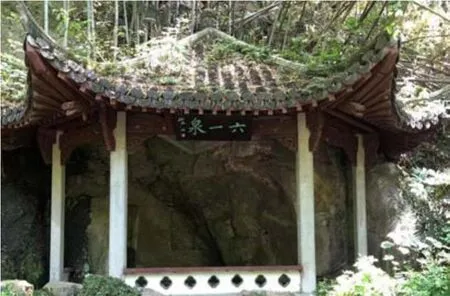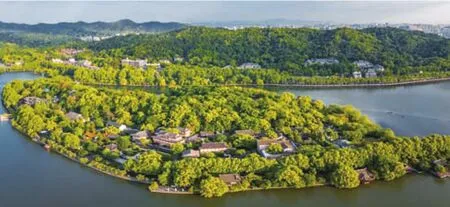“六一泉”边东坡庵
2022-08-26司马一民
文/ 司马一民
北宋欧阳修写了不少吟咏西湖的诗词,其中有《采桑子十首》,每首都以“西湖好”开头,有人读了以为他到过杭州,其实是误解,欧阳修吟咏的西湖,是颍州西湖,不是杭州西湖。不过虽然欧阳修从未到过杭州,但却是与杭州颇有渊源,其中一个渊源就和六一泉有关。
其实,现在很多杭州人不知道六一泉。六一泉在哪里?为什么叫六一泉?
六一泉在孤山,距西泠印社不远,有一座不起眼的小亭子,倚靠着石壁,亭上有一块匾额“六一泉”,落款是苏轼,亭前有一眼泉。
要说六一泉的来历,得先说苏东坡两次在杭州为官。熙宁四年(1071年),苏东坡上书谈论新法的弊病被贬,出任杭州通判。苏轼上任途中去颍州拜见恩师欧阳修,欧阳修介绍苏东坡去西湖孤山见惠勤和尚,说此人诗情俱佳,值得交往。苏东坡在杭州上任后第三天,即去孤山拜访惠勤,两人相见畅谈甚欢,成为密友。第二年,欧阳修去世,两人在孤山遥哭祭拜。元祐四年(1089年),苏东坡以龙图阁学士任杭州知州,再次到孤山拜访惠勤,而惠勤早已不在人世,只见到惠勤弟子二仲,在挂着惠勤与欧阳修画像的厅堂,苏东坡感概万分。二仲告诉苏东坡,附近有一眼泉水是前几个月突然流出的,像是刻意在欢迎苏东坡再次到杭州为官,二仲恳求苏轼,对此事写点文字。欧阳修号“六一居士”,苏东坡便用欧阳修的名号,将此泉命名为“六一泉”,同时欣然写下了《六一泉铭并序》,并作铭说:“泉涌出之处,千里之外于您欧阳公所在的颍州,在您仙逝十八年之后,我将泉命名为‘六一’,会不会有点荒诞?君子对后世的影响不止于五世,智者的精神可以惠泽千秋万代。我想与您欧阳公的精神一起神游于孤山之上,俯视着吴越大地,赞美锦绣河山,饮用着这甘甜的泉水。您的君子之风或许久体现在这甘甜的泉水之中。”
接着,苏东坡在“六一泉”边建了一间茅屋,取名东坡庵,时不时来住几天,缅怀欧阳修。师生情谊如此深厚,难得。
孤山上的“六一泉”,就因苏东坡的《六一泉铭并序》而闻名于天下。后人多有诗词凭吊。几百年之后,孤山寺已是“废寺”,“六一泉”仍然“泉流圃”,引得诗人感慨。

六一泉。The Liuyi Spring.
简单说说苏东坡与欧阳修的关系。宋仁宗嘉祐二年(1057年),二十岁的苏东坡和弟弟苏辙随父亲苏洵进京赶考,那一年的主考官是五十岁的欧阳修。当时的考试制度规定要将所有考生的名字遮盖掉,这叫糊名;有时甚至叫人把所有的文章重新抄写一遍后,才送考官阅卷,两种方法都是为了防止阅卷考官徇私。考官们都为这次的一份考生的卷子叫好,题目为《刑赏忠厚论》,公推第一,欧阳修看了也很赞赏。欧阳修判断,这很有可能是他的得意弟子曾巩的卷子,为避免被人说主考官徇私,欧阳修就把这份卷子判为第二名。这位列为第二名的考生就是苏东坡。后来殿试,苏东坡、苏辙兄弟皆进士及第。仁宗退朝后,欣喜地对高皇后道:“朕今日为子孙找到两个宰相了!”
发榜后,按照古代读书人的习俗,考生要给主考官写一封谢恩信,苏轼给欧阳修修了一份谢恩信。欧阳修接到苏东坡的信读得浑身出汗,欧阳修的儿子以为父亲突然身体不舒服,问要不要要请医者,欧阳修说没有生病,是读苏东坡的书信而快意流汗。欧阳修对儿子说,三十年后再也无人谈论你父亲的文章,而人人都会读苏东坡的文章,“吾当避此人出一头地”。意思是要帮助苏东坡得到超出一般人的地位。这也是“出人头地”典故的由来。爱才的欧阳修从此对苏东坡提携有加。
最后说说“六一居士”的名号。欧阳修晚年号“六一居士”。欧阳修自解:家有藏书一万卷,金石遗文一千卷,琴一张,棋一局,酒一壶,一老翁,六一也。
The Liuyi Spring and the Dongpo Cottage
By Sima Yimin
Ouyang Xiu (1007-1072), renowned Northern Song (960-1127) poet and politician, wrote many verses about the West Lake,including ten on plucking mulberries, each beginning with “West Lake is good”. As a result, some mistakenly believe that he had been to Hangzhou before. In fact, the “West Lake” in his poems refers to the one in Yingzhou (present-day Fuyang city, Anhui province). Although Ouyang had never been to Hangzhou, he was intimately connected with the city, and one connection is the Liuyi Spring.
Where is it? Why was it so named?
The Liuyi Spring is on the Solitary Hill. Not far from the Xiling Seal Art Society, a humble pavilion leans against a stone wall, on top of which hangs a tablet inscribed “Liuyi Spring” and signed by Su Shi (aka Su Dongpo, 1037-1101).
Su twice served in the Hangzhou government. In 1071, he was demoted to Hangzhou for criticizing the New Policies of Wang Anshi (1021-1086). On his way to take office, Su went to Yingzhou to meet his mentor Ouyang Xiu, who suggested Su visit a monk named Huiqin living on the city’s Solitary Hill. On the third day after Su assumed his position in Hangzhou, he went to Huiqin’s place. The two hit it off right away, chatting merrily, and soon became close friends. The following year, when Ouyang Xiu passed away, they wept together and sent their condolences at the hill.
In 1089, Su took up the post of prefect of Hangzhou, and he went again to drop a visit on Huiqin at the Solitary Hill. However,he only managed to meet Erzhong, one of Huiqin’s disciples,as Huiqin had passed away. Then Erzhong told Su that a spring suddenly emerged nearby a few months ago, as if welcoming Su’s return to Hangzhou. He then pleaded with Su to pen some words.Su happily obliged. He named the spring “Liuyi Spring” after the art name of Ouyang Xiu (Liuyi Jushi or Six-One Retiree) and left an epigraph.
In it Su wrote, “At the place where the spring water flows,which is a thousand miles away from Yingzhou, where you spent your last days, I named it in your honor, some 18 years after you ascended heaven. Might it be a bit ridiculous? The influence of a gentleman will last for more than five generations, and the spirit of a wise man can benefit thousands of generations. I’d prefer to wander with your spirit on the Solitary Hill, overlooking the land of Wu and Yue, admiring the beautiful rivers and mountains, and drinking the sweet spring water. Your gentlemanliness may well have been reflected in the sweet spring water.”
Later Su built a cottage near the Liuyi Spring and named it the Dongpo Cottage, where he would stay from time to time in memory of Ouyang Xiu.
In 1057, the then 20-year-old Su Dongpo and his younger brother Su Zhe (1039-1112) traveled to the capital for the imperial examinations. The chief examiner at the time was Ouyang Xiu. According to the rules, all candidates’ names should be covered up on their essay papers — sometimes all the essay papers needed to be re-transcribed before they were sent for marking, to prevent favoritism. One paper won acclaim from all the examiners,including Ouyang. Since he believed that the paper belonged to one of his favorite students, he deliberately placed it second. As it turned out, it was done by Su Dongpo.
Why did Ouyang Xiu call himself Liuyi Jushi or Six-One Retiree in his later years? He explained: he had one large collection of books (over 10,000 volumes), one large collection of stone inscriptions and epitaphs (over 1,000), one(ancient Chinese pluck instrument), one chessboard, one pot of wine and one old gentleman in himself, hence “Six ‘One’”.

杭州孤山。肖奕叁/摄The Solitary Hill in Hangzhou city. Photo by Xiao Yisan.
